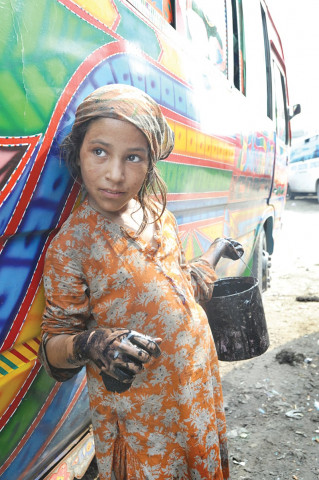Risks and vulnerabilities: Govt urged to take concrete steps to build resilience, rehabilitate IDPs
UNDP human development <br /> report says Pakistan’ HDI has been flat since 2008.

They also called for taking measures to rehabilitate the more than one million internally displaced persons (IDPs) of North Waziristan and other areas besides improving administrative capacities for the sustainability of steps regarding their revival and rehabilitation.
According to the report, staggering rates of poverty, high inequality and frequent natural disasters and crises threaten the progress of human development in developing countries. Addressing these challenges, according to the report, require a host of initiatives including universal provision of social services and a strong system of social security benefits to the citizens.
The panelists largely focused on the Federally Administrated Tribal Areas (Fata), where people were deprived of their basic human and constitutional rights, which in turn has turned it into one of the least developed regions in the country.
The report, “Reducing Vulnerabilities and Building Resilience”, includes the human development index (HDI) for 187 countries. The HDI is calculated using economic and human development indicators. Pakistan stands at 146 out of 187 countries measured in the HDI rankings. For comparison, India and Bangladesh stand at 135 and 142 respectively, while Sri Lanka, despite decades of civil war, is ranked 73rd.
The report says that despite overall gains in human development, progress in all regions decelerated between 2008 and 2013 when compared to the 2000 to 2008 period. According to the report, the annual growth in HDI declined from two per cent between 2000 and 2008 to almost zero during the latter period.
In the last two decades, most countries have registered significant improvements in human development, the report says, adding that vulnerability and impact of crisis and disasters were undermining the hard won progress or slowing down its growth.
The report says that progress could not be sustained without building resilience of the people.
UNDP Country Director Marc Andre Frache presented the key recommendations of the report. Department for International Development (DFID) Pakistan Head Richard Montgomery said that the report could help generate debate on how best to build Pakistan’s resilience and a more inclusive economy and society.
Federal Minister of Ministry of States and Frontier Regions (SAFRON) Major-Gen (retd) Abdul Qadir Baloch reiterated the government’s commitment to work for the rehabilitation of the IDPs.
The panel members included journalist Zahid Hussain, Joint Political Parties Committee on FATA Reforms member Bushra Gohar, FATA Reforms Commission Chairperson Ejaz Qureshi and others. Journalist Sidra Iqbal moderated the discussion.
The panelists discussed the possible reforms required to establish the rule of law and efficient institutions in Fata. The opinions highlighted the measures that could be taken to cope with recurring risks and vulnerabilities in Fata.
The report says that those who face multiple risks and vulnerabilities were especially at risk of falling back into poverty if disasters or crises continue to occur.
“Pakistan’s investments in resilience today are the ultimate win-win, reducing adverse impact and costs freeing resources for additional investments where it matters.”
Bushra Gohar termed Fata the “federally abandoned tribal areas”, saying the British Raj promulgated the Frontier Crimes Regulation and successive Pakistani governments continued with the colonial regulations.
Ejaz Qureshi said that 60 per cent of IDPs were women and children and many women have not yet gotten their Computerised National Identity Cards due to illiteracy, conservatism and other issues.
Published in The Express Tribune, September 18th, 2014.



















COMMENTS
Comments are moderated and generally will be posted if they are on-topic and not abusive.
For more information, please see our Comments FAQ